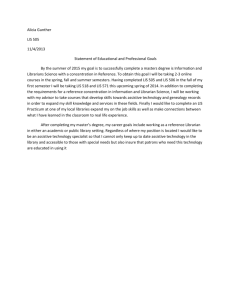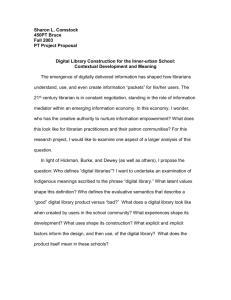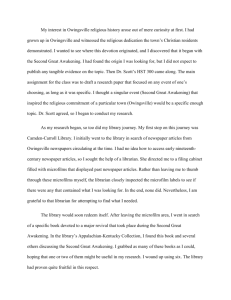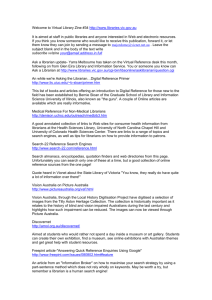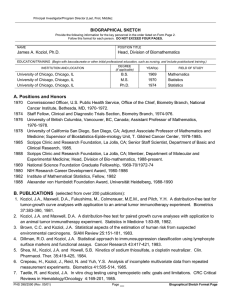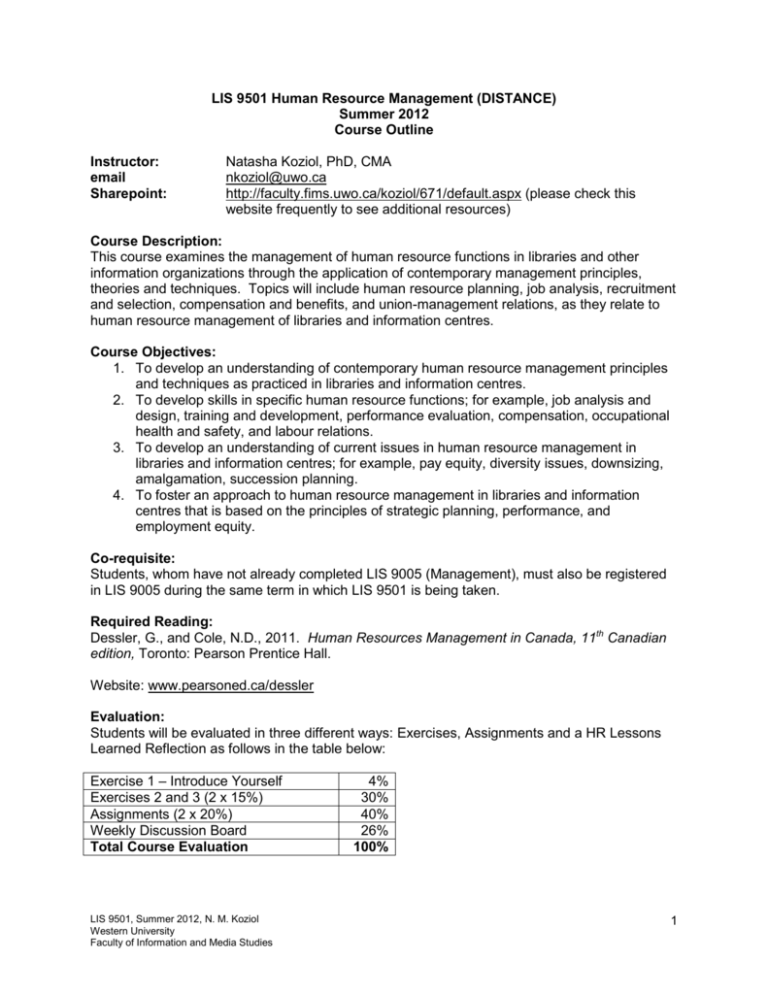
LIS 9501 Human Resource Management (DISTANCE)
Summer 2012
Course Outline
Instructor:
email
Sharepoint:
Natasha Koziol, PhD, CMA
nkoziol@uwo.ca
http://faculty.fims.uwo.ca/koziol/671/default.aspx (please check this
website frequently to see additional resources)
Course Description:
This course examines the management of human resource functions in libraries and other
information organizations through the application of contemporary management principles,
theories and techniques. Topics will include human resource planning, job analysis, recruitment
and selection, compensation and benefits, and union-management relations, as they relate to
human resource management of libraries and information centres.
Course Objectives:
1. To develop an understanding of contemporary human resource management principles
and techniques as practiced in libraries and information centres.
2. To develop skills in specific human resource functions; for example, job analysis and
design, training and development, performance evaluation, compensation, occupational
health and safety, and labour relations.
3. To develop an understanding of current issues in human resource management in
libraries and information centres; for example, pay equity, diversity issues, downsizing,
amalgamation, succession planning.
4. To foster an approach to human resource management in libraries and information
centres that is based on the principles of strategic planning, performance, and
employment equity.
Co-requisite:
Students, whom have not already completed LIS 9005 (Management), must also be registered
in LIS 9005 during the same term in which LIS 9501 is being taken.
Required Reading:
Dessler, G., and Cole, N.D., 2011. Human Resources Management in Canada, 11th Canadian
edition, Toronto: Pearson Prentice Hall.
Website: www.pearsoned.ca/dessler
Evaluation:
Students will be evaluated in three different ways: Exercises, Assignments and a HR Lessons
Learned Reflection as follows in the table below:
Exercise 1 – Introduce Yourself
Exercises 2 and 3 (2 x 15%)
Assignments (2 x 20%)
Weekly Discussion Board
Total Course Evaluation
LIS 9501, Summer 2012, N. M. Koziol
Western University
Faculty of Information and Media Studies
4%
30%
40%
26%
100%
1
Exercises:
Students will complete three exercises from the course schedule at the back of the course
outline starting on page 5. All students will complete the first “Introduce Yourself
Exercise.” Two additional exercises will need to be selected and completed. These exercises
require advanced reading of the subject to determine how these activities, videos or cases
stimulate strategic human resource management. They are meant to be applied situations that
reflect the reality of working in a library. Students are encouraged to find additional resources to
support their exercises beyond that given in the course outline. Each exercise should follow
these guidelines:
Spacing – double-spaced
Font – 12 Arial or Times New Roman
Margins – one inch
Word Count – 250-500 words
Due Dates: ongoing (exercises may be handed in early when completed)
Really Important – demonstrate your use of HR concepts
Assignments:
Assignments will give the student an opportunity to study a topic related to Human Resource
Management in Libraries in greater depth. Students will select two assignments from the
course schedule at the back of the course outline starting on page 5. Please consult the
Checklist for Minimally Acceptable Standards for Written Papers in this course on pages 3-4 of
this course outline. Citations and references should follow the APA style (given on page 4).
Students are encouraged to find additional resources to support their assignments beyond that
given in the course outline. Each assignment should follow these guidelines:
Spacing – double-spaced
Font – 12 Arial or Times New Roman
Margins – one inch
Word Count – 750 - 1 000 words + bibliography
Due Dates: ongoing (assignments may be handed in early when completed)
Really Important – demonstrate your use of HR concepts
All required readings and additional resources will serve as a starting point for each assignment,
but further supplementation should occur with other relevant articles, books, websites and
journals as appropriate. Sources that are not from the library literature, like sociology,
management and business literatures, might also be consulted. All written assignments will be
evaluated with the following criteria:
1. parsimonious statement of problem, question or issue
2. conceptual definition or framework (if relevant)
3. evidence to support the argument
4. appropriate use of available resources
5. logical structure and organization
6. professional appearance
7. grammar, punctuation and citation format
8. your opinion matters – demonstrate professional judgement
Weekly Discussion Board:
The weekly discussion board will have questions posted by the professor and answered
in the discussion board forum of the course website by the students. The students will
benefit from the interactions with their classmates and they can observe their evolution
of acquiring knowledge in human resources management. The discussion board
LIS 9501, Summer 2012, N. M. Koziol
Western University
Faculty of Information and Media Studies
2
questions will typically be applied questions related to working in the library. They will
be posted on Monday of each week and will be available for discussion until Thursday
at midnight. Each week there is 2% allocated to the discussion board questions for a
total of 26% of the course evaluation as described below:
Weekly
Allocation
1.8 to 2%
1.5 to 1.75%
1.0 to 1.4%
0 to 0.9%
Explanation of Evaluation
Takes a leadership role within the discussion due to exemplary
knowledge in human resources management
Demonstrates the acquisition of human resources management
concepts and continues to evolve with input from the discussion board
Has limited understanding of human resources management
concepts and does not incorporate new information from the
discussion
Makes no unique contribution that demonstrates understanding of
human resources management – repeats other students’ comments
Policy on Plagiarism:
All MLIS students should be proud of their unique learning styles and their abilities to convey
their ideas in written form. They should endeavour to flourish in the MLIS program by
communicating their knowledge in conjunction with that of others through the utilization of
accepted citation protocols (See APA Citation Style below). There will be no tolerance for
plagiarism in this course. The Senate for The University of Western Ontario defines plagiarism
as follows:
“Plagiarism: Students must write their essays and assignments in their own words. Whenever
students take an idea, or a passage from another author, they must acknowledge their debt
both by using quotation marks where appropriate and by proper referencing such as footnotes
or citations. Plagiarism is a major academic offence.
STATEMENT ON ACADEMIC OFFENCES:
“Scholastic offences are taken seriously and students are directed to read the
appropriate policy, specifically, the definition of what constitutes a Scholastic Offence, at
the following Web site:
http://www.uwo.ca/univsec/handbook/appeals/scholastic_discipline_grad.pdf
“All required papers may be subject to submission for textual similarity review to the
commercial plagiarism-detection software under license to the University for the
detection of plagiarism. All papers submitted for such checking will be included as
source documents in the reference database for the purpose of detecting plagiarism of
papers subsequently submitted to the system. Use of the service is subject to the
licensing agreement, currently between The University of Western Ontario and
Turnitin.com (http://www.turnitin.com).”
Medical Documentation:
Students seeking academic accommodation on medical grounds for any missed tests, exams,
assignments or participatory components worth 10% or more of their final grade for the course
must apply to the Academic Counseling Office of their home faculty and provide documentation
LIS 9501, Summer 2012, N. M. Koziol
Western University
Faculty of Information and Media Studies
3
in the form of a Student Medical Certificate. For work worth less than 10% of the final grade, the
instructor will consider requests for academic accommodation on medical grounds made in a
timely manner in writing or by appointment in office hours. Such requests need not be
accompanied by documentation. The instructor may, however, decide to require documentation
be submitted to the appropriate Academic Counseling office.
CHECKLIST FOR MINIMALLY ACCEPTABLE STANDARDS FOR WRITTEN PAPERS
This checklist should serve as a guide to minimally acceptable criteria for written papers.
Please note that these are MINIMAL guidelines. Adhering to them without the content specified
in the assignment is not enough for a passing grade.
Title page with title of paper, name of student, mailbox number, class, section, semester
and date
Minimum font size is 12-point type
Double-spaced lines
Pages numbers
Section headings relevant to content
Citations in APA style (see below) for all ideas or claims drawn from other sources,
including personal and online sources
Reference list of all cited works in APA style at end of paper
Includes print as well as web-based sources
Includes peer-reviewed articles and/or scholarly works
Correct grammar and spelling, particularly:
o Knowing the difference between plurals and possessives, such as libraries
(plural) and library’s (possessive) or libraries’ (plural-possessive)
o Agreement between the subject and verb
o Using complete sentences, not sentence fragments
o Not using single-sentence or run-on paragraphs
o Using a, an, and the appropriately
o Agreement in number between pronouns and the nouns to which they refer; i.e.,
do not use sentences like “the student (singular) must turn in their (plural) papers
by…”
Citation in APA Style:
Details of this style can be found in the Publication Manual of the American Psychological
Association, Fifth Edition. GRC has a copy. However for more complex sources (e.g., article
with three to five authors) you will need to consult the APA publication manual (see
http://www.apastyle.org/).
In particular, citations for electronic sources must include the source such as the aggregated
database from which the article was retrieved; online journal; website or web page; newsgroup;
web- or email-based discussion group; or web- or email-based newsletter. A brief guide to
citation of electronic sources can be found at: http://www.apastyle.org/elecref.html.
Assignment and Exercise Submissions
1. Please submit assignments and exercises to my email address: nkoziol@uwo.ca
2. Assignments are to be submitted as .doc or .docx or .pdf attachments
LIS 9501, Summer 2012, N. M. Koziol
Western University
Faculty of Information and Media Studies
4
Item
Description
Introduce
Yourself
Exercise
Assignment #1
On the website, you will find a document entitled Introduce Yourself Exercise.
Complete the form and submit it via email. This exercise must be completed by
everyone.
This assignment will incorporate your reading of Chapter 2, as pdf document and a
few websites. It involves a realistic scenario about a disabled librarian. In the role
of this librarian, assess the situation and respond to any relevant questions posed.
Scenario:
You are a contract librarian who recently became physically disabled. Although
you are still mobile in a wheelchair your contractual hours have been drastically
reduced to 6 hours per week from 36 with your recent contract renewal. The
library manager has emphatically stated that this is due to budgetary cuts and
nothing else. You believe it is discrimination because the other able-bodied
librarians did not have their hours reduced.
Questions to Consider:
1. Is this discrimination? If so, why? If not, why not?
2. What options does the librarian have? What legislation is in place to
prevent discrimination
3. What statistics are available to prove that disabled individuals are
discriminated against in their work environments?
4. What does the Canadian Paraplegic Association say about discrimination
of the disabled?
5. What does the Honourable David Onley say in his installation speech
about discrimination and the disabled?
Sample Job
Description
Exercise
Required:
On the website, you will find a document entitled Sample Job Description Exercise.
Complete the form and submit it via email. Use the job advertisement to help you
create the job description for Spring Arbor University for Librarian, Online &
Distance Learning. You will not have full and complete information and so you
will have to be creative in order to fill the requirements of the job description. Also
consider using information on the NOC website below.
National Occupational Classification (NOC)
http://stds.statcan.gc.ca/soc-cnp/2006/ts-rt-eng.asp?cretaria=b
Resources
Chapter 1 text and ppt
Due
Date
May 11
Introduce Yourself Exercise
Chapter 2 text and ppt
May 18
Canadian Paraplegic Association
http://www.canparaplegic.org/en/
Lieutenant Governor of Ontario, Honourable David
Onley, Installation Speech
http://www.lt.gov.on.ca/en/
Case Study:
http://www.mla.gov.uk/what/support/toolkits/libraries_dis
ability/case_studies/lisza
Creating Workplace Environments that Reflect Human
Rights Values (pdf file)
Government of Alberta Disability Discrimination Case
Studies:
http://www.albertahumanrights.ab.ca/publications/case_
studies/physical_disability.asp
May 25
Chapter 4 text and ppt
Sample Job Description Exercise
Brumley, R. (2005). Neal-Schuman directory of public
library job descriptions (1st ed.). New York; London:
Neal-Schuman.
Librarian, Online & Distance Learning, Spring
Arbor University
http://www.ischool.utoronto.ca/jobsite/2012/librarianonline-distance-learning
Faculty Unionization (pdf file)
LIS 9501, Summer 2012, N. M. Koziol
Western University
Faculty of Information and Media Studies
5
Item
Interview
Questions
Exercise
Assignment #2
Description
Resources
On the website, you will find a document entitled Questions Commonly Used in
Selection Interviews. Consider your own upcoming interviews after you graduate
with your MLIS degree and answer the following questions.
Chapters 6 and 7 text and ppt
Required:
1. Does this list provide enough objective evidence for a potential employer
to make a hiring decision?
2. Is it a comprehensive list or are there questions that need to be
addressed?
3. What additional questions might you expect to have directed at you in
your interviews for jobs in the library, archives, or information centres?
4. What is your personal interview strategy?
Effective Employment Screening Practices (pdf file)
Most libraries can only meet their goals and objectives with volunteers.
Unfortunately, many volunteers are never trained to perform their important roles
and so can create inefficiencies and costs for the library, in addition to problems
with human resources.
Required:
1. Read the case scenario below.
2. Before they begin, should you interview volunteers and require basic skill
sets?
3. Why is it important to train volunteers?
4. How would you structure the activities for the training event(s) for the
student volunteers?
5. Do you want to train all of the student volunteers or only the keen ones?
6. Prepare a budget assuming you have $2 000 to spend – so spend it!!!!
7. State all assumptions.
Case Scenario:
You have a number of student volunteers at the Toronto Public Library. Many of
these volunteers are only trying to get their 40 hours of community service required
to graduate from high school and are not really interested in the library. As a
library manager, you want to hold a training event for these student volunteers to
train them on two new skills: 1) customer service and 2) a new self-checkout
system for patrons’ items. You currently have 100 student volunteers.
LIS 9501, Summer 2012, N. M. Koziol
Western University
Faculty of Information and Media Studies
Due
Date
June 1
Questions Commonly Used in Selection Interviews
Interviews (pdf file)
Informational Interviewing and the Art of Networking
(pdf file)
University of South Carolina School of Library and
Information Science. (2005). Frequently asked interview
questions. http://www.libsci.sc.edu/career/invufaqs.htm
Bad Hire Calculator,
http://www.hrworld.com/calculators/badhire/
Chapter 8 text and ppt
June 15
Keys to Good Customer Service video series
http://www.expertvillage.com/videoseries/4805_customer-service.htm
Toronto Public Library – Volunteering at the Library
http://www.torontopubliclibrary.ca/sup_vol_index.jsp
Planning for Staff and Volunteer Training in Museums
(pdf file)
The Grantmeker Forum on Community & National
Service (2003). The cost of a volunteer: What it takes
to provide a quality volunteer experience. Retrieved
online from:
http://www.worldvolunteerweb.org/fileadmin/docs/old/pd
f/2003/03_04_08USA_costvolunteer.pdf
Nicol, E.A., & Johnson, C.M. (2008). Volunteers in
libraries: Program structure, evaluation, and theoretical
analysis. Reference & User Services Quarterly, 48(2),
154-163.
6
McGown, S.W. (2007). Valuable volunteers: How to
find, use, and keep them. Library Media Connection,
26(2), 10-13.
Wolfner Library for the Blind and Physically
Handicapped website:
www.sos.mo.gov/wolfner/volunteer/handbook.pdf
Waters, R.D., Bortree, D., (2010). Building a Better
Workplace for Teen Volunteers Through Inclusive
Behaviours. Nonprofit Management & Leadership,
20(3).
Item
Performance
Appraisal
Exercise
Description
Resources
In the following scenario a librarian struggles with his/her life challenges while
watching his/her once exemplary levels of performance erode. The new
library manager wants to prove his/her competence in the job and is
considering whether the librarian should be fired.
Chapters 10, 12 and 13 text and ppt
Required:
1. In the role of Library Manager (given below), write a précis outlining a
performance meeting between you and this librarian that fully
demonstrates whether the librarian should be retained or not.
2. Further, determine whether a resolution or compromise to these
challenges is possible.
3. Generate a specific action plan with a logical time horizon.
Leadership and Motivation at Work
http://www.youtube.com/watch?v=LD72GzaxxuI&fea
ture=channel
Librarian
You have been very distracted at work as a 5-year librarian in North Bay,
Ontario and you are aware that your performance has been not up to your
normal exemplary standards. Your teenage son is failing miserably at school
and you aren’t sure why; your 85-year old mother is becoming very forgetful
and you are worried she is showing signs of Alzheimer’s disease; you are also
having financial difficulties personally. You have kept these issues to yourself
and have not informed the HR manager for reasons of information privacy.
Basics of Conducting Employee Performance
Appraisals
http://managementhelp.org/emp_perf/perf_rvw/basic
s.htm
Due
Date
June
22
A Guide to the Personal Health Information
Protection Act (pdf file)
American Psychological Association
Family and Relationships
http://www.apa.org/helpcenter/family/index.aspx
Library Manager
You have only been in your job for 3 months. As the HR Manager, you are
concerned with the deteriorating performance of this librarian. After 3
warnings of increasing severity, you believe you have few options left but to
fire this person for poor performance. You want to pass your own probation
period for your job and so this would be a sign to your boss that you can deal
with difficult tasks in a professional manner.
LIS 9501, Summer 2012, N. M. Koziol
Western University
Faculty of Information and Media Studies
7
Item
Video
Exercise
Description
Watch the video entitled Librarians Gone Wild and answer the following
questions.
Required:
1. Is there a role for humour in the library work environment?
2. Do activities such as those in the video help to build camaraderie,
reduce stress, and/or develop the culture in the library? Defend your
arguments.
Assignment
#3
Humor in the Workplace (pdf file – on our website)
There is a common misperception that the library is a safe place for its
employees. However, there are countless examples of instances where
employees are not safe from physical, psychological, or emotional
abuse. Bullying in the workplace is one of the most insidious forms of
psychological abuse that often goes unreported.
Are MLIS programs doing enough to emphasize the importance of
safety?
Resources
Due
Date
July 6
Chapter 13 text and ppt
Librarians Gone Wild Video
http://www.youtube.com/watch?v=3Ju3z-EtFQE
Overdue Laughs
http://www.librarysupportstaff.com/libhumor.html
New Spice | Study like a scholar, scholar
http://www.youtube.com/watch?v=2ArIj236UHs
Chapters 14 and 15 text and ppt
July 13
Staying Safe: Revisiting Security Measures in
Libraries (pdf file)
Faculty Better Protected Under Ontario’s New
Workplace Violence and Harassment Law (pdf file)
Management of Disruptive Behaviour (pdf file)
Required:
1. What are your views about safety in the library?
2. Is the library becoming more unsafe?
3. What type of training would you like to have in order to be safer in the
library?
4. What measures do libraries require in order to have a safe work
environment?
5. Are health and safety policies effective at reducing unsafe situations?
OPSEU Harassment and Discrimination Policy
http://www.opseu.org/committees/policy.htm
Bullying in the Workplace (two articles)
http://www.osach.ca/products/resrcdoc/rvioe528.pdf
http://canadasafetycouncil.org/workplacesafety/bullying-workplace
Bill 168: An Act to Amend the Occupational Health and
Safety Act (Violence and Harassment in the
Workplace), 2009. (2010). Chapter No. S.O. 2009
C.23. Ontario: Ministry of Labour. Retrieved from
http://www.ontla.on.ca/web/bills/bills_detail.do?locale=
en&BillID= 2181&BillStagePrintId=4499&btnSubmit=go
Topper, Elisa F. 2008. "How Safe Is Your Library?" New
Library World 109.3/4 : 182-84. Print.
LIS 9501, Summer 2012, N. M. Koziol
Western University
Faculty of Information and Media Studies
8

